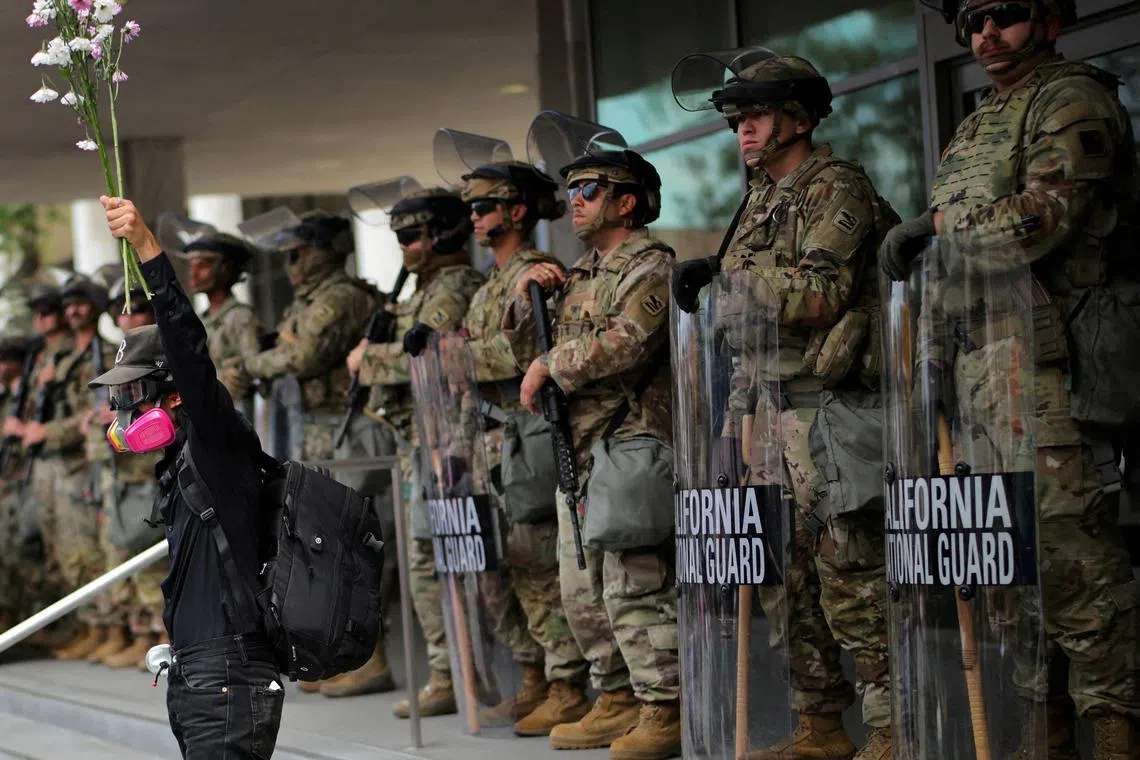US court lets Trump keep control of California National Guard for now
Sign up now: Get ST's newsletters delivered to your inbox

US President Donald Trump’s decision to send troops into Los Angeles prompted a national debate about the use of the military on US soil.
PHOTO: REUTERS
Follow topic:
WASHINGTON – A US appeals court let President Donald Trump retain control on June 19 of California's National Guard while the state’s Democratic governor proceeds with a lawsuit challenging the Republican President’s use of the troops to quell protests in Los Angeles.
Mr Trump’s decision to send troops into Los Angeles prompted a national debate about the use of the military on US soil and inflamed political tension in the country’s second most-populous city.
On June 19, a three-judge panel of the San Francisco-based 9th US Circuit Court of Appeals extended its pause on US District Judge Charles Breyer’s June 12 ruling that Mr Trump had unlawfully called the National Guard into federal service.
Mr Trump probably acted within his authority, the panel said, adding that his administration probably complied with the requirement to coordinate with California Governor Gavin Newsom, and even if it did not, he had no authority to veto Mr Trump’s directive.
“And although we hold that the President likely has authority to federalise the National Guard, nothing in our decision addresses the nature of the activities in which the federalised National Guard may engage,” it wrote in its opinion.
Mr Newsom could still challenge the use of the National Guard and US Marines under other laws, including the bar on using troops in domestic law enforcement, it added.
The Governor could raise those issues at a court hearing on June 20 in front of Judge Breyer, it said.
In a post on X after the decision, Mr Newsom vowed to pursue his challenge.
“The President is not a king and is not above the law,” he said. “We will press forward with our challenge to President Trump’s authoritarian use of US military soldiers against our citizens.”
Mr Trump hailed the decision in a post on Truth Social.
“This is a great decision for our country and we will continue to protect and defend law-abiding Americans,” he said.
“This is much bigger than Gavin, because all over the United States, if our cities, and our people, need protection, we are the ones to give it to them should state and local police be unable, for whatever reason, to get the job done.”
Judge Breyer’s ruling was issued in a lawsuit against Mr Trump’s action brought by Mr Newsom.
The judge ruled that Mr Trump violated a US law governing a president’s ability to take control of a state’s National Guard by failing to coordinate with the governor.
It also found that the conditions set out under the statute to allow this move, such as a rebellion against federal authority, did not exist.
Judge Breyer ordered Mr Trump to return control of California’s National Guard to Mr Newsom.
Hours after Judge Breyer acted, the 9th Circuit panel had put the judge’s move on hold temporarily. Amid protests and turmoil in Los Angeles over Mr Trump’s immigration
Mr Trump also ordered 700 US Marines to the city after sending in the National Guard. Judge Breyer has not yet ruled on the legality of the Marine Corps mobilisation.
At a court hearing on June 17 on whether to extend the pause on Judge Breyer’s decision, members of the 9th Circuit panel questioned lawyers for California and the Trump administration on what role, if any, courts should have in reviewing Mr Trump’s authority to deploy the troops.
The law sets out three conditions by which a president can federalise state National Guard forces, including an invasion, a “rebellion or danger of a rebellion” against the government or a situation in which the US government is unable with regular forces to execute the country’s laws.
The appeals court said the final condition had probably been met because protesters hurled items at the immigration authorities’ vehicles, used trash dumpster as battering rams, threw Molotov cocktails and vandalised property, frustrating law enforcement.
The US Justice Department has said once the president determines that an emergency exists that warrants the use of the National Guard, no court or state governor can review that decision. The appeals court rejected that argument.
The protests in Los Angeles ran for more than a week before they ebbed, leading Los Angeles Mayor Karen Bass to lift a curfew she had imposed.
In its June 9 lawsuit, California said Mr Trump’s deployment of the National Guard and the Marines violated the state’s sovereignty and US laws that forbid federal troops from participating in civilian law enforcement.
The Trump administration has denied that troops are engaging in law enforcement, saying they are instead protecting federal buildings and personnel, including US Immigration and Customs Enforcement officers.
The 9th Circuit panel is composed of two judges appointed by Mr Trump during his first term and one appointee of Democratic former US president Joe Biden. REUTERS

